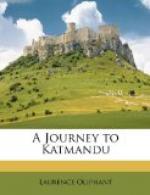But even supposing the public were better informed on Indian affairs, it would not be a matter of surprise that they should be under a misconception as to what Jung’s position in his own country might be, seeing that it is not usual amongst European nations to send their prime ministers on foreign missions. But to estimate correctly the minister’s power and authority, the word “send” perhaps ought not to be used in this case, since he was a self-appointed ambassador; and his next brother was left by him to perform the arduous duties attendant on the important office which he vacated for a while.
And now that he is returned to resume the reins of government, and once more become involved in the petty intrigues of his highland court, it is natural that he should look back with delight, not unmingled with regret, at the wonders he has so lately witnessed—the, to him, magical effects of the operations of steam—the still more incomprehensible electric telegraph—our institutions—our court—the magnificence of the successive entertainments, of which he could say “Magna pars fui,” and at which he was not more the spectator than the spectacle: but, above all, was it a matter of astonishment to him that such hospitality should have been shown to an unknown and ignorant stranger by a nation whose enterprise is no less stirring than her resources are vast, and in the midst of a social machinery to him so incomprehensibly intricate in its details.
“Why,” he would observe after his return to Katmandu, “should I attempt to tell these poor ignorant people what I have seen? It would be as ridiculous in me to suppose they would believe it as it is hopeless to attempt to make them understand it.” And he feels that the information he has acquired has been too extensive to allow him to sink to the level of those by whom he is surrounded. But, while anxious to increase his popularity, with his attempts at conciliation is combined a patronizing air, which he cannot conceal, and which is calculated to render him unpopular, even could he bring himself to return to the old system of embracing instead of shaking hands; of taking off his shoes when entering the Durbar; of salaaming ere he addresses his Monarch—all which acts of devotion and homage are repugnant to the man who has had an interview with the Queen of England, and received a visit from the Duke of Wellington. “When that great warrior called upon me,” he says, “I felt it to be the proudest moment of my life:” and at Benares, when, upon the occasion of his visiting a native Rajah, there was a question of whether he should go in state or not, he decided the matter by saying, “I shall go just as I went to return the Duke’s visit;” or, at another time, “I will receive the Rajah in a friendly way, just as I did the Duke when he called upon me.” Nothing seemed to impress him so deeply as the absence of all display where genuine greatness rendered it unnecessary; and he looks with no slight contempt upon the pomp to which




